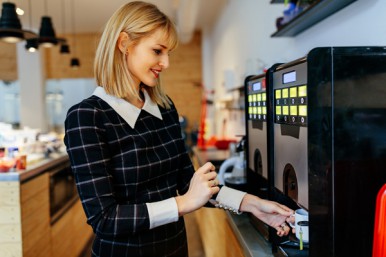In the last ten years, we have seen a steady growth of younger business owners within our vending and self-serve retail customer base, many of whom have taken over family-owned businesses. Whether it is adopting next generation payment technology, expanding to healthier products choices, or implementing work-life balance initiatives in their offices, the next generation is already reshaping the industry for the future. I recently attended NAMA’s Coffee Tea and Water show in November, where the impact of younger generation business owners was clear when you walked through the door and received your free reusable water bottle, in lieu of plastic disposable cups.
For Millennials and soon, Generation Z, business owners, it may be more than their own personal choices driving these shifts. Younger generations are making purchase decisions based on how well a retailer is able to check the right boxes. Can they pay with their mobile device? Do they offer me products in line with my preferences? Will this item increase my carbon footprint? Younger owners are aligning their businesses for the future.
While sustainability, in particular, may be a stressor for an industry built upon single-use items, particularly those wrapped in plastic (about half of the packaging waste in the U.S. comes from food and beverage products), there is a great deal of opportunity here. The rising Generation Z consumer is not only an avid snacker according to an NPD report referenced in a Vending Times piece, but is willing to spend more on sustainable products. According to the 2019 Retail and Sustainability Survey by CGS, “more than two-thirds of [Generation Z] respondents consider sustainability when making a purchase and are willing to pay more for sustainable products.”
This is a great opportunity for vending operators, already equipped to accept mobile and cashless payments (which have shown to increase sales) to start expanding their selection into sustainable goods and practices. Here are some things to start thinking about:
- Compostable and Zero Waste Snack Packaging – Start to investigate products with more sustainable packaging, such as those that are compostable or zero waste. Sun and Swell Foods recently launched compostable packaging, making it ”one of the first snack companies in the US market to do so,” according to the news. The company started rolling out its compostable packaging in March and aims to have all of its product lines transitioned over by 2020.
- Replacing Plastic Bottles – We are seeing more and more news about the impact of plastic water bottles on the environment. Sustainable alternatives such as canned, boxed and edible water are becoming more common and can open up new sources of revenue for vending operators. Recently, Cove announced fully biodegradable water bottles that melt if they end up in the ocean. The company also plans to source water near the markets where it sells.
- Route Optimization for Smaller Carbon Footprint – The further a truck drives the higher its greenhouse gas emissions and the larger its carbon footprint. For vending companies with multiple routes running, implementing cloud-based solutions that determine when a machine needs to be stocked and the particular items (as well as those that will likely sell based on past purchases) can often reduce the number of routes necessary. Our client Automatic Food Services (AFS) recently reported that after leveraging an enterprise-wide platform for their vending machine and office coffee business, saw not only a more than 45 percent increase in sales per route, but were able to consolidate their total number of routes through an organization-wide simplification of scheduling, delivery and servicing.
Whether vending companies have a younger leader at the helm or not, knowing what coming generations are expecting can guide business decisions to ensure operators are not only keeping pace, but anticipating future behavior. Younger generations are paying attention to sustainable trends, and are already deciding with their wallets which companies and brands are worthy of a future. As vending operators consider the longevity of their business – or even future succession plans – it is going to be critically important that they remain relevant with evolving expectations around meeting sustainability expectations of today’s consumers.
